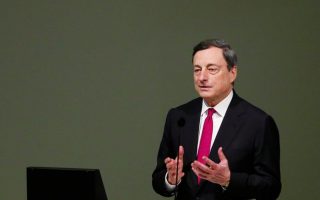Eurozone inflation dips in March, raising stakes for ECB

Eurozone inflation unexpectedly slowed in March, adding to the pressure on the European Central Bank (ECB) as it battles an economic slowdown which threatens to undo years of stimulus.
Headline inflation in the 19 countries sharing the euro slowed to 1.4 percent in March from 1.5 percent a month earlier, short of market expectations for a steady rate and also well below the ECB’s target of almost 2 percent.
In a more worrying sign, a closely watched underlying inflation figure that excludes volatile food and energy prices, slowed to 1.0 percent, its weakest reading since April 2018.
Although wages are rising and employment is at a record high, consumer prices have repeatedly disappointed and underlying inflation remains weak, baffling policymakers and putting in doubt the central bank’s ability to control prices.
ECB President Mario Draghi has long predicted a rise in underlying inflation, only for the data to disappoint and forcing the ECB to ask for even more time to lift prices.
“Today’s price data should further depress inflation expectations in the market, all the more so as the headline inflation rate fell to 1.4 percent in March,” Commerzbank economist Christoph Weil said on Monday.
“It is likely to remain well below the ECB’s inflation target of close to 2 percent over the rest of the year.”
Still, some of the core inflation drop may be reversed next month, some economists said, attributing the fall to seasonal factors as Easter is in April this year, suggesting that some price rise around the holiday are likely to come later.
Energy price rise
Although the ECB ended its 2.6 trillion euro bond purchase scheme at the end of last year, it has put plans to “normalise” policy on hold, delaying a rate hike into next year.
It is also working on plans to give banks even more cheap loans, hoping to maintain the flow of credit to the economy.
Energy prices were the only major component of the index that accelerated in March, to a rise of 5.3 percent year-on-year from 3.6 percent in February.
But an even more narrow core inflation reading, which also excludes alcohol and tobacco and is watched closely by market economists, decelerated to 0.8 percent from 1.0 percent in February, against the average expectation of 0.9 percent.
Eurostat data showed separately that the unemployment rate was unchanged at 7.8 percent of the workforce in February against January, but the number of people out of a job fell to 12.730 million from 12.807 million in January.
[Reuters]





